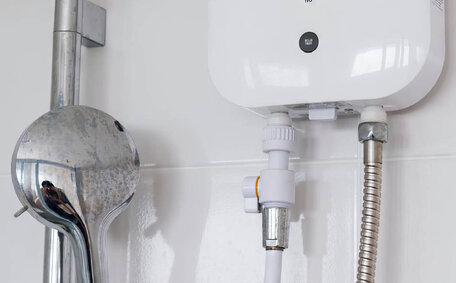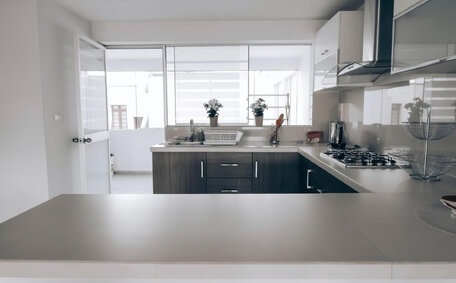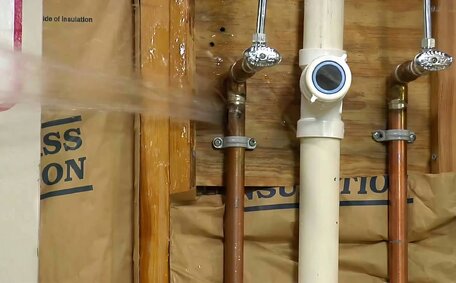Dangers of Improper Gas Appliance Disposal
Incorrect disposal of gas appliances, such as stoves, heaters, and air conditioners, poses significant risks to humans and the environment, underscoring the need for correct disposal practices.
Gas appliances and air conditioners carry harmful substances like refrigerants, insulation materials, and metals that, without proper waste service handling, can annually contaminate soil and water. Refrigerants, which require safe recycling from appliances, particularly those in air conditioners, like CFCs and HCFCs, may lead to ozone layer damage and global warming if released into the atmosphere.
Metals such as mercury and lead, found in components and pipes, can leach into the ground if not correctly disposed of, leading to uptake by plants and animals, with serious environmental consequences. Bioaccumulation through the food chain impacts wildlife and, over time, can lead to serious health issues for humans, which means the stakes for proper disposal are incredibly high.
If old appliances are not professionally disconnected and the gas is not accurately shut off, attempts to dispose of them could result in gas leaks or explosions, incorrectly making them part of a hard waste collection. Legally, once the removal of your old appliances is planned, there must be no delay; a licenced gasfitter is required to turn off your gas supply and verify the absence of leaks.
Improper disposal of old gas canisters and flammable substances can cause landfill fires and toxic releases, highlighting the importance of correct disposal methods. Understanding critical recycling methods for various types of waste and hazardous materials is key to preventing harm to refuse workers and nearby communities.
Given the risks, it is essential to know how to safely dispose of gas appliances such as cookers by hiring a licensed gasfitter for authorised recycling and disposal services.
Local Regulations for Gas Appliance Disposal
In the Bexley and greater Sydney area, specific state government regulations dictate how to dispose of gas appliances from your home and businesses safely.
Gas appliances like gas stoves, ovens, hot water systems, and gas heaters are considered hazardous materials that require special handling, prompting you to consider 'what do I gain by waste recycling?'. By law, a licenced gasfitter must turn off gas supply and ensure there are no leaks before removing the appliances to dispose old units as hard waste.
It’s illegal to place old gas appliances on the curb for standard council cleanup. They can’t be placed in your household waste bins either. Doing so risks fines from local authorities.
Efficiently getting rid of old units may involve taking appliances and any LPG cylinders to service stations for authorised resource recovery or disposal. Some cylinder recycling centres may charge drop-off fees. Contacting us in advance to determine how gas disposal services may impact the cost of discarding appliances like your old oven is wise, since policies vary between councils.
Some companies focus on recycling gas appliances and also may sell your scrap metal components. Refrigerants, insulation foam, plastics, and other hazardous substances necessitate careful disposal to avert environmental contamination and safety hazards.
By learning more about regulations, homeowners seeking ways get their old appliances safely disposed can take proactive steps to reduce landfill waste and prevent recycling contamination. Proper action and disposal recycling help get your appliances managed to minimise dangers from potential gas leaks or explosions.
To responsibly discard old ovens and other appliances, or to find out about disposal services in your area, get in touch with your local council. A professional gasfitter can also safely remove your gas appliances, ensuring waste disposal and compliance with hazardous materials regulations.
Safely Disconnecting Gas Appliances
Safely disconnecting old gas appliances is the crucial first step in their disposal process. A licensed gasfitter should be enlisted to prioritise safety during disconnection.
Here is a broad overview of what’s involved in safely disconnecting common gas appliances found in Australian homes before disposal or recycling:
Stoves & Ovens
A gasfitter will inspect the cylinder valve to:
- Turn off the isolation valve connecting the appliance to the gas supply line.
- Disconnect any flexible gas hose or gas can from the appliance.
- Cap or plug any open gas fittings.
- Conduct leak testing using leak detection fluid.
- Provide a gas disconnection certificate.
Hot Water Systems
When dealing with hot water systems, the gasfitter will also:
- Drain any remaining water from your tank which is part of your hot water system, lines, and your empty gas bottles, etc.
- For safety when disposing of appliances, eliminate risk by turning off the electrical supply at the isolator.
- Remove exterior covers/cladding if required for access.
Gas Space Heaters
With gas heating appliances, in particular, the gasfitter will:
- Carefully extract and cap any exposed gas lines.
- Test for gas leaks from fittings and pipes.
- Make sure all internal components are intact.
- Remove side panels if needed to seal openings.
The key is that all gas appliances, tanks, old gas cylinders, and even your barbecue are completely emptied and sealed by an authorised professional before disposal. Safety should always come first when disconnecting old units.
Recycling and Reuse Options
Components from gas heating appliances and air conditioners should be recycled, not discarded, regardless of the weather.
Metals like stainless steel, aluminium, copper and brass can recycled and repurposed efficiently. Plastics, rubber gaskets from your heater and hazardous waste materials like insulation foam and refrigerants can be managed well in specialty recycling programmes. Glass from oven or stove doors is recyclable too.
Recycling gas appliances like stoves and heaters reduces waste and conserves natural resources. Recycling properly prevents contamination that occurs when hazardous substances from appliances seep into waste streams.
Local recycling facilities in Bexley for gas appliance parts and disposal include:
- Bexley Resource Recovery Centre
- Rockdale Recycling Centre
- SIMS Metal Management
- Bingo Industries
Some recyclers and scrap dealers may also purchase metals, like copper pipes and fittings, recovered from old gas appliances and you might find out they pay market rates by the kilo. This helps offset recycling costs.
If your old appliances such as gas units are still functional, donating them to charity or as second-hand goods is a wise alternative to disposal. However, it’s important to have all units safely disconnected by a licenced gasfitter before transferring them to new owners.
With some effort, you can recycle components of your gas stove and ensure they are reused responsibly, keeping hazardous parts out of landfills.
Donating Still-Working Appliances
For gas appliances like stoves, ovens and hot water systems that are still in working order, you can responsibly rid old units by donating to charity, embodying an environmentally-friendly alternative to disposal.
Before donating any appliance, ensure a licensed gasfitter certifies its safety and properly seals all gas connections. Make sure all components are working well and there are no leaks, faults or other issues.
When considering appliances for donation, evaluate:
- Good physical condition without dents or damage
- All knobs, handles, doors fully intact
- Heating elements and burners working correctly
- No strange smells or noises during operation
Check out places such as charities like Vinnies, the Salvation Army, or St Vincent de Paul to donate functioning gas appliances. You can also list them for free on sites like Gumtree or Facebook Marketplace for pickup.
When advertising washing machines or any appliances for donation, provide details on the make, model, and testing certification from a licenced gasfitter. This gives prospective recipients peace of mind on safety.
Effort towards donating your gas appliances can prevent them from unnecessarily ending up in landfills. This approach benefits both the environment and families in need.
Make sure all components are working well and there atal and Plastic Recycling
It is crucial to separate metal and plastic components for recycling instead of sending them straight to landfill.
Metals like steel, aluminof quality, conserving natural resources in the manufacturing process. You can safely recycle your old plastics from insulation, pipes, knobs and panels, as they can also be processed and reused in many cases.
Recyclers that specialise in e-waste often accept these appliance parts for recycling. In some cases, scrap metal businesses may also purchase metals recovered from gas appliances.
Check recycling symbols and sort plastics from working appliances such as air conditioners to ensure effective recycling. Thermoset plastics like insulation foam require specialty recycling methods. Drop-off fees may apply for certain plastic types and quantities.
Responsible metal and plastic recycling can keep many appliance components out of landfills with proper sorting. This keeps their embodied energy and material value in use, reducing contamination and waste by dropping off at the right facilities.
Junk Removal and Recycling Services
In the Bexley and greater Sydney area, there are professional junk removal and recycling services where can you can find assistance with the safe disposal of old gas appliances.
These services will send trained technicians to carry out gas cylinder disposal, disconnect, dismantle, and remove white goods like old ovens, stoves, and hot water systems from homes and businesses. They adhere to stringent safety procedures regarding gas appliance handling endorsed by industry bodies.
Junk removal crews will also manage the disposal of separated components, such as metals, plastics and hazardous materials, through approved recycling and waste transfer facilities, which can reduce environmental impact. These have dedicated gas safety methods, including gas cylinder disposal, for the drop off of appliances and e-waste not suitable for regular landfill.
The benefits of using reputable junk removal and recycling services include:
- Fast, efficient removal of bulky appliances.
- Compliance with hazardous materials and environmental regulations. No fines for incorrect disposal.
- Reducing the burden on local landfill sites.
- Recycling and safe handling of dangerous components like pressurised cans or toxic insulation.
So for worry-free gas appliance disposal, a removal company offers an end-to-end solution, especially when it’s time to clear your space of unwanted items. They can provide all required transportation, dismantling, separation and recycling services professionally and affordably.
Safe Transportation and Storage
When transporting and storing gas appliances from your home while awaiting disposal or recycling, it’s essential to ensure they are handled with proper safety precautions.
Firstly, ensure that all gas connections and lines are disconnected and sealed by a licensed gasfitter before moving appliances. Attempting to transport appliances without ensuring you get rid of your remaining gas could risk dangerous leaks.
Securely transport appliances upright in your vehicle or trailer to protect them from damage. Fragile components like doors and knobs should be removed and packed separately if necessary.
For storage before recycling, store appliances in an area shielded from weather, ensuring fresh air circulates to avoid any gas buildup. Ensure the storage area is well-ventilated to prevent a buildup of residual gas fumes. Units can be stacked neatly but should remain upright and stable.
Regularly inspect stored appliances for signs of damage, shifting, or leaks. If you perceive any alterations, engage a professional recycling/disposal company to take care of the matter swiftly.
By taking care with transportation and storage, gas appliances can await responsible recycling or disposal without putting safety at risk through damage, leaks or accidents.






